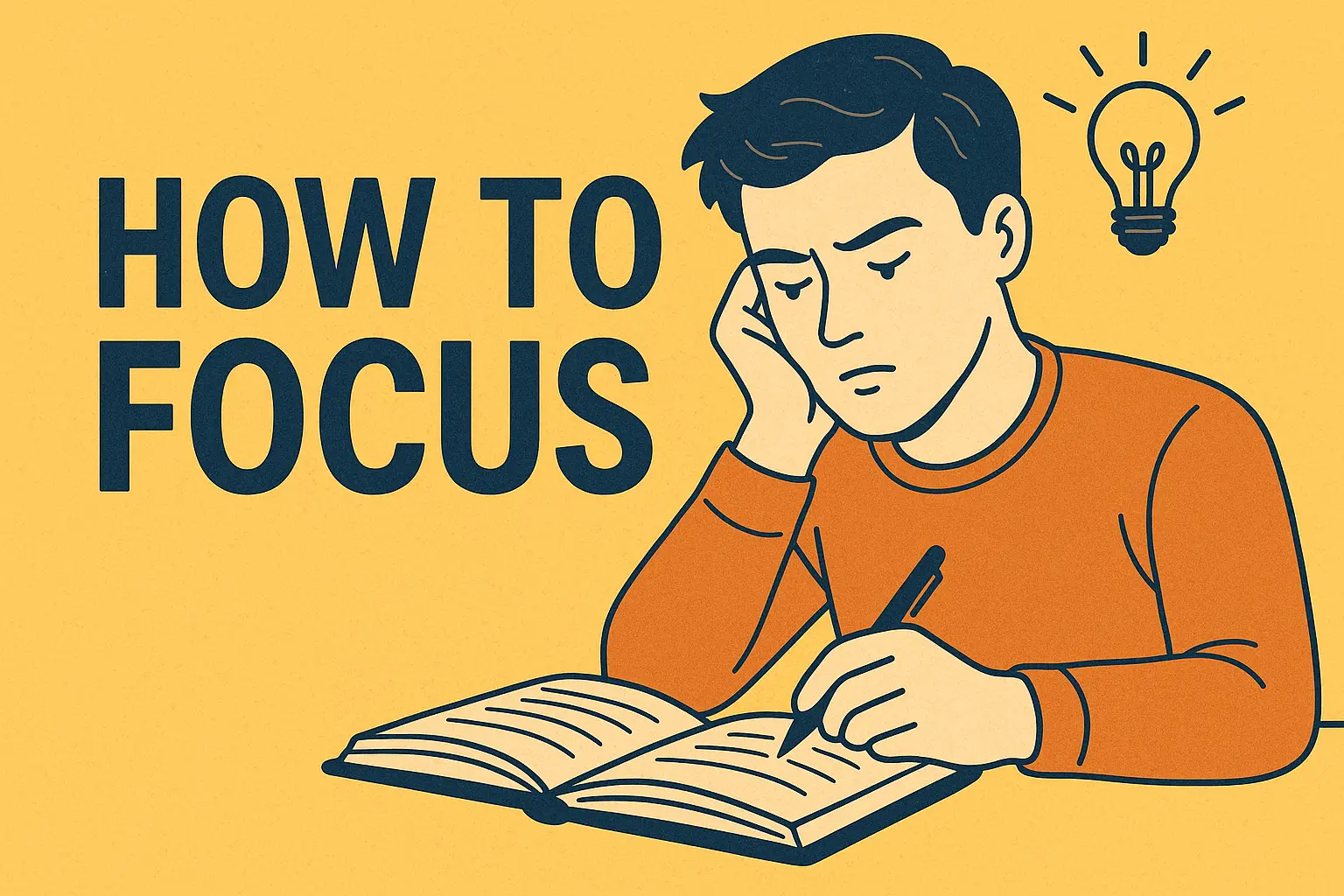
Finding it hard to stay concentrated? This guide on how to focus offers practical strategies to boost your concentration in today’s busy world. Learn actionable tips to clear distractions and maintain your focus, helping you achieve your goals more effectively.
Key Takeaways
- Enhance your focus by creating a distraction-free environment, managing both external and internal disturbances.
- Practice mindfulness and regular breaks, utilizing techniques like the Pomodoro Technique to refresh concentration.
- Set clear priorities and break tasks into manageable steps to streamline focus and boost productivity.
Understanding Focus and Its Importance
Focus is the mental ability to concentrate on relevant information, complete tasks, and acquire new information effectively. It allows us to pay attention to what truly matters while filtering out unnecessary distractions. However, in today’s fast-paced world, many people face trouble concentrating due to constant distractions and a noisy environment. The good news is that you can improve your focus through time and practice. Practicing mindfulness, for instance, trains the brain to stay focused on the present moment, enhancing overall concentration and mental fitness.
Understanding the importance of focus is crucial for productivity and personal growth. When we eliminate distractions and remain mentally staying focused, we unlock our potential to achieve our goals and perform well in various tasks.
Focus is not just about saying no to distractions but also about saying yes to what truly matters. By concentrating on processes rather than events and managing our energy effectively, we can maintain long-term focus and achieve greater success and satisfaction in life.
What is Focus?
Focus is the ability to concentrate on one task, eliminating distractions from your surroundings. Think of it as a mental spotlight that highlights specific stimuli, allowing you to stay engaged and productive. There are different types of focus, including selective attention, which lets you pay attention to one thing while ignoring others, and sustained attention, which enables you to stay focused on a task for an extended period. Various factors, such as time pressure and motivation, can influence our ability to concentrate.
Our cognitive capacity can be significantly improved when we remove distractions, such as keeping smartphones out of sight. Urgent deadlines often motivate us to focus intently on a task, showcasing how external pressures can impact our concentration and attention span. However, some individuals may find themselves easily distracted by their environment.
By understanding the different types of focus and the factors affecting them, we can better manage our attention and improve our overall concentration skills, enhancing our concentration and focus.
Why Focus Matters
Focus is crucial for productivity and personal achievement. When we concentrate on a task, we unlock the ability to accomplish it effectively, as saying no to other options helps us stay on track. Being mentally focused is essential for learning, achieving goals, and performing well in various tasks.
Moreover, focus is a skill that can be developed through practices like meditation and mindfulness. By improving our focus, we can better manage our mental resources, reduce stress, and enhance our overall well-being.
Assess Your Current Ability to Focus
Before we can improve our focus, it’s essential to assess our current ability to concentrate. With practice and patience, focus can be mastered and strengthened over time. Developing habits that train the brain to concentrate better is crucial for enhancing concentration skills. Setting time limits for focused work sessions, getting adequate rest, and organizing your day can significantly improve your ability to focus.
Mindfulness and meditation are effective ways to improve focus, as they help you stay present and reduce stress. Cognitive training activities can also enhance cognitive abilities like concentration, making them valuable tools for anyone looking to improve their focus.
Adopting a growth mindset can further enhance your focus, as it encourages you to see challenges as opportunities for growth. Improving your concentration can positively impact your productivity and boost productivity and performance in various aspects of life.
Self-Assessment Techniques
Self-assessment techniques are invaluable for understanding your current ability to focus. One effective method is to track your ability to stay focused during tasks over a set period. This can involve journaling about your daily focus experiences and measuring how well you concentrate over time.
Regularly reviewing your self-assessment results helps you identify personal focus patterns and areas needing improvement. By understanding your current focus levels, you can adjust your strategies to improve concentration and achieve better results.
Identifying Distractions
Recognizing distractions is crucial for enhancing focus, as they can stem from both the environment and personal mindset. Constant distractions from an always-connected world, such as social media notifications and radio noise, can significantly impact our ability to focus. Internal distractions, such as exhaustion, worry, and anxiety, can also hinder focus.
Being well-rested and maintaining positive thoughts can help reduce these internal distractions. By identifying and addressing both external and internal distractions, you can improve your focus and concentration skills.
Create a Distraction-Free Environment

Creating a distraction-free environment is essential for improving focus. Understanding both external and internal factors affecting concentration is crucial for enhancing your ability to concentrate. Information overload, for example, can hinder focus by overwhelming your capacity to filter necessary information.
To create a distraction-free environment:
- Silence your phone and declutter your workspace.
- Use tools like desk organizers, noise-canceling headphones, and proper lighting to enhance productivity.
- Find a quiet spot without interruptions, such as a library or a private room, to improve focus.
To improve focus and productivity:
- Request to be left alone during specific times to minimize interruptions while you work.
- Complete one task before moving to another to maintain mental clarity and reduce the chances of errors.
- Create an environment free of distractions to enhance concentration and productivity.
Declutter Your Space
A decluttered workspace can significantly enhance your ability to focus by reducing visual and mental distractions. To maintain an organized workspace, consider the following strategies to clear clutter:
- Establish a routine for desk cleaning at the end of each week.
- Keep only necessary items on your desk.
- Organize documents to facilitate a tidy environment.
A clean and organized space not only contributes to better focus but also promotes greater overall productivity.
Manage Digital Distractions
Managing digital distractions is essential for maintaining focus. Silencing notifications and implementing ‘do not disturb’ settings during work hours can significantly reduce digital interruptions. Encouraging employees to wear noise-canceling headphones can also help reduce background noise distractions.
By managing digital distractions effectively, you can improve your concentration and stay focused on your tasks.
Practice Mindfulness
Mindfulness is the practice of being aware and present in the moment. Staying engaged in the present sharpens attention and hones mental resources on relevant details. To stay in the now means being fully engaged in the present and avoiding distractions from the past or future. Paying attention to breath to refocus attention is a technique for maintaining attention when distractions are present.
Mindfulness meditation has been shown to enhance attention and emotional regulation with regular practice. Practicing mindfulness enhances focus and mental resource management.
Mindfulness Exercises
Mindfulness exercises can significantly enhance one’s ability to focus by training the mind to be present. Focused attention meditation helps maintain concentration by keeping awareness on a specific object or sensation. Open monitoring meditation, on the other hand, trains you to observe experiences without focusing on any particular object, aiding in the management of distractions.
Incorporating mindfulness exercises into daily routines can lead to improved focus, better stress management, and enhanced overall well-being.
Benefits of Mindfulness
Mindfulness and related activities offer several benefits:
- Improved concentration and efficiency in task completion through mindfulness.
- Boosted focus and positive emotions by living in the present moment.
- Enhanced mental well-being and creative thinking through nature walks.
Regular nature walks can foster creativity in addition to enhancing focus and may also encourage mind wandering.
Limit Multitasking
Engaging in multitasking can significantly reduce productivity as it divides attention and increases the likelihood of errors. Instead of multitasking, focusing on a single task allows for deeper concentration and better outcomes, doing one thing at a time.
To minimize distractions from technology while studying, consider the following tips:
- Keep your phone out of sight to avoid distractions from text messages.
- Avoid checking email before noon to eliminate distractions and maintain your focus.
- Limit multitasking to improve your focus and achieve better results in your tasks.
The Myth of Multitasking
Multitasking reduces focus and productivity. When switching tasks, overall performance is disrupted. Multitasking forces your brain to switch focus back and forth quickly between tasks, a process known as the switching cost. Multitasking avoids the difficult work of choosing one focus.
Listening to a podcast while responding to an email is one example of multitasking. Another example is talking on the phone while writing a report. After checking email, it typically takes 64 seconds to resume a previous task. Multitasking reduces productivity significantly.
Single-Task Strategies
To improve concentration, adopt single-tasking as your primary approach. Giving your full attention to a single task instead of multitasking leads to better results. Employing single-tasking strengthens your ability to monitor and maintain focus on tasks and can also help improve attention.
A recommended exercise to enhance focus is:
- Read for 30 minutes, with a timer set to go off every five minutes.
- If you find yourself stuck on a task, switch to a different task to stay alert and productive.
- Always aim to complete your current task.
- After finishing, move on to the next one.
Take Regular Breaks
Taking regular short breaks is essential to refresh focus and maintain high performance. It is important to take breaks after working for a long time to avoid burnout and reset attention spans. During breaks, one can engage in different activities like stretching or taking a walk to improve concentration.
Working on a task for a long period leads to a breakdown in focus, making concentration increasingly difficult. By taking regular breaks, you can improve your focus and productivity.
Pomodoro Technique
The Pomodoro Technique involves 25 minutes of focused work followed by a short break. Utilize the Pomodoro Technique by working for 25 minutes. After that period, take a few minutes for a 5-minute break.
This method helps improve focus and concentration by allowing regular intervals of rest for long periods, preventing burnout, and maintaining high productivity.
Mental Break Activities
Taking short breaks during study sessions is essential for keeping your brain fresh. During a break, consider moving around, talking to someone, or switching tasks to refresh your mind. Effective breaks often involve activities that provide intrinsic motivation and enjoyment.
By incorporating mental break activities into your routine, you can maintain focus and productivity.
Enhance Cognitive Function with Brain Training
Cognitive training can help sharpen mental skills crucial for maintaining attention. It can significantly enhance various cognitive abilities, including attention and processing speed. Task switching during multitasking can cause cognitive overload, which negatively impacts focus and memory retention. People often overestimate their multitasking abilities, leading to a drop in their efficiency and an increase in mistakes related to cognitive tasks.
Incorporating greenery into workspaces can lead to enhanced cognitive performance. By engaging in cognitive training, you can boost your concentration and overall cognitive function.
Brain Training Games
Brain training games are designed to enhance cognitive function and improve processing speed, which can lead to better focus. Examples of popular brain training games include puzzles, memory games, and problem-solving tasks that challenge the mind.
It’s important to track progress while engaging in brain training games, as this allows for an assessment of cognitive improvements over time. By regularly playing brain training games, you can improve your concentration and cognitive abilities.
Measure Progress
Measuring results is crucial for maintaining focus as it provides feedback and helps track progress towards goals. Tasks that are measured in terms of focus tend to remain focused on, emphasizing the significance of tracking progress. The relationship between measurement and focus is that measurement itself helps maintain focus and concentration.
To understand our progress in focus, we need to consistently measure our results. By measuring progress, you can keep your performance high and stay focused on the task at hand.
Improve Physical Health

Factors that affect sleep include:
- Electronic device use
- Light exposure
- Exercise timing
- Hydration
- Establishing a bedtime routine
Regular exercise plays a crucial role in improving focus by enhancing blood flow to the brain. Balanced nutrition is vital for improving focus, with the Mediterranean diet proven to enhance memory and mental clarity.
Improved focus leads to better retention of information, making study habits more productive and effective. By improving physical health, you can enhance your cognitive function and overall well-being.
Get Enough Sleep
Proper sleep is essential for improving focus. Aim for 7-9 hours of sleep to maintain focus. Tiredness makes it difficult to concentrate. Use blue light filters or glasses, avoid electronics before bed, and establish a bedtime routine to improve better sleep hygiene.
Calming the mind before bed or using sleep sounds can also help if you struggle with sleep. Blue light stimulates the retina and prevents melatonin secretion, which can disrupt your sleep. By ensuring you get enough sleep, you can improve your concentration and overall mental health.
Exercise Regularly
Engaging in regular physical activity can increase brain volume in areas linked to thinking and memory. Regular physical activity is essential for enhancing cognitive abilities and overall brain health. Aerobic exercise plays a crucial role in boosting brain health and cognitive function.
By exercising regularly, you can improve your focus, reduce stress, and maintain a healthy mind and body.
Connect with Nature
Spending time outdoors can refresh your mind and enhance your ability to concentrate. Engaging in activities like walking meditation while in nature can further improve your focus. Nature has a calming effect that can help reduce stress and improve mental clarity, especially for those who feel stressed.
Connecting with nature sounds can boost concentration and overall well-being.
Nature Walks
Engaging in nature walks can enhance your ability to concentrate while providing a refreshing break from routine. Taking nature walks boosts concentration and helps you feel refreshed. The natural environment provides a serene backdrop that can help clear your mind and improve focus.
Incorporating nature walks into your routine enhances cognitive function and mental health.
Indoor Plants
Plants increase concentration, productivity, and overall workplace satisfaction. Having indoor plants in your workspace can create a more inviting and pleasant environment. Indoor plants improve air quality, leading to a healthier workspace.
The presence of greenery has a positive influence on employees’ mood and motivation. By adding indoor plants to your workspace, you can enhance your focus and create a more enjoyable work environment.
Set Clear Priorities
Establishing clear priorities can lead to improved focus on essential tasks. Write down daily goals and identify a single priority. Warren Buffett’s method involves writing down 25 goals, circling the top 5, and avoiding the remaining 20. Tasks that are not top priorities become the Avoid-At-All-Cost list.
An anchor task is a main priority task that guides daily work. By setting clear priorities, you can streamline your focus and enhance productivity.
Daily Goal Setting
Creating a daily goal list allows you to identify and focus on your most important tasks. Setting specific, achievable goals each day can lead to enhanced motivation and clearer focus. Establishing clear goals before study sessions greatly enhances concentration and time management.
Creating a daily list of priorities helps streamline focus and enhances productivity. By setting daily goals, you can improve your focus and achieve better results.
Break Tasks into Steps
Dividing tasks into smaller, manageable steps can help maintain focus and prevent overwhelm. Dividing larger projects into smaller, actionable steps helps maintain motivation and reduces procrastination. Dividing larger tasks into smaller, actionable steps improves clarity and maintains focus throughout the process.
Establishing milestones within a task makes it easier to track progress and stay focused. Setting deadlines for smaller tasks fosters accountability and encourages consistent progress. Completing smaller components of a project can reduce anxiety and boost motivation. By breaking tasks into steps, you can maintain clarity and focus.
Summary
In summary, improving focus is essential for productivity, personal growth, and overall well-being. By understanding the importance of focus, assessing your current ability to concentrate, and creating a distraction-free environment, you can enhance your concentration skills. Practicing mindfulness, limiting multitasking, taking regular breaks, and engaging in brain training can further boost your focus. Additionally, improving physical health, connecting with nature, and setting clear priorities are crucial for maintaining concentration. Implement these tips to enhance your focus and achieve your goals with greater ease.
FAQs
To boost your focus, practice mindfulness and create a distraction-free space while avoiding multitasking. Incorporate regular breaks and brain training into your routine for even better results!
To boost your focus, minimize distractions like digital notifications, background noise, and interruptions from others. Prioritize creating a quiet environment and managing internal worries to enhance your concentration!
Mindfulness enhances focus by training your brain to stay present and engaged, making it easier to tackle tasks with reduced stress and improved emotional regulation. Embrace mindfulness, and watch your concentration soar!
Taking regular breaks is essential for keeping your mind fresh and preventing burnout, ultimately boosting your productivity and focus. Embrace those breaks and watch your effectiveness soar!
Improving your physical health through regular exercise and adequate sleep can significantly enhance your focus and cognitive function. Embrace these habits to boost your concentration and mental clarity!
Techniques such as deep breathing, gently bringing your attention back to the present moment, and using time management methods like the Pomodoro Technique can help you regain and maintain focus effectively.










































































